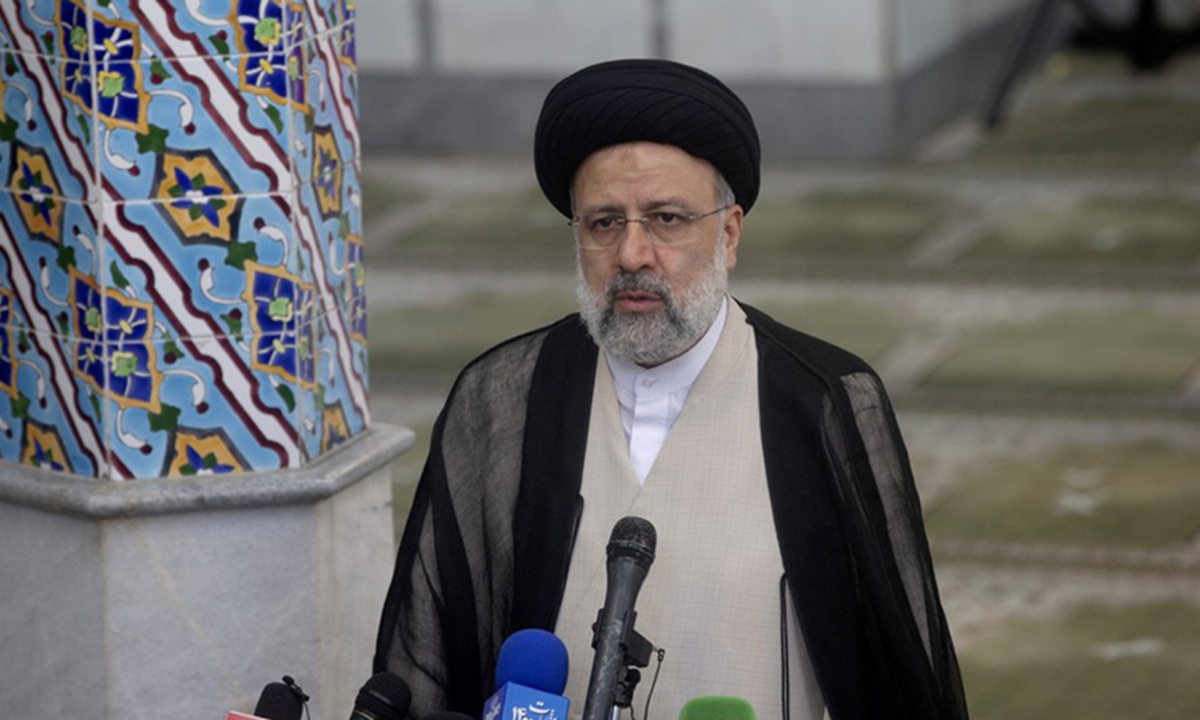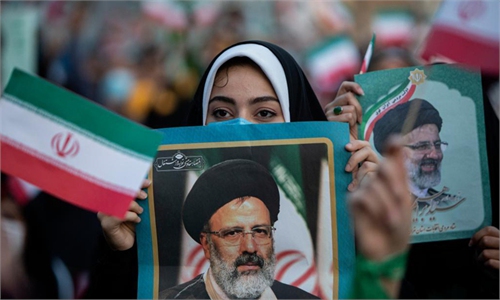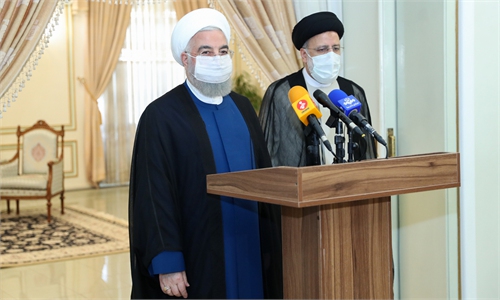
Ebrahim Raisi speaks after casting his ballot at a polling station in Tehran, Iran, June 18, 2021. Photo: Xinhua
Ebrahim Raisi has won Iran's presidential election, as expected. Educated in the seminary, Raisi has served in several positions in Iran's judicial system. He ascended from chief justice to president and is likely to be the next supreme leader. His life experience features both hard line and Shia clerics.
When it comes to the Raisi administration's foreign policy, two aspects should be considered. Firstly, in terms of dealing with the West, Raisi is expected to take a tough line in defending Iran's economic and security interests. In January, 2020, Raisi said that Iran planned to sue the then US president Donald Trump for the assassination of General Qasem Soleimani. In January 2021, Raisi warned that Soleimani's killers "will not be safe on Earth," during a ceremony in Tehran to mark the one-year anniversary of the drone assassination of Soleimani.
"Do not presume that someone, as the president of America, who appeared as a murderer or ordered a murder, may be immune from justice being carried out. Never," said Raisi, adding, "those who had a role in this assassination and crime will not be safe on Earth."
Secondly, Raisi will attach great importance to strengthening security cooperation and religious ties with Islamic countries, and pay close attention to the Israeli-Palestinian issue.
Regardless of his hard line, Raisi's top priority is to address livelihood problems caused by the US sanctions. Although Raisi is talking tough, rejecting the possibility of meeting with US President Joe Biden, this does not mean Raisi's government will take a radical confrontational policy against the US. After Raisi's new government formally takes office, hardliners in Iran are likely to promote a new nuclear agreement, which will be helpful for improving Iran's economy.
Raisi will be formally inaugurated as Iran's president on August 3, when the US-Iran relationship might witness many possibilities. On the whole, whether the Raisi administration admits it or not, Washington will remain an important and even the primary factor affecting Iran's domestic and diplomatic interests.
Some analysts argue that Raisi will center his foreign policy on the "Look East" strategy, which means closer cooperation with China and Russia after he takes office. The advancement of Iran-China relations and Iran-Russia relations has always been supported by the supreme leader Khamenei. The Raisi administration will continue the existing cooperation framework and mechanisms with China and Russia. Iran's relations with China and Russia are hopeful to enjoy development in the following two fields.
First, China and Russia are likely to take further active steps on the Iranian nuclear deal, especially by hosting events to address relevant problems. Raisi will continue to emphasize the roles of China and Russia in helping restore the nuclear deal.
Second, China and Russia may, within the framework of the Organization of Islamic Cooperation (OIC), further exert the positive influence of Islamic factors on the trilateral relations between China, Russia and Iran.
Raisi is not only the next president, but also the possible supreme leader. The Islamic factor will be an important ideological foundation for his foreign policy. On June 13, China's first-appointed representative to the OIC submitted his appointment letter to the secretary-general of the organization, which marked the establishment of China's institutional links with the organization. Besides, Russia is an observer country of the OIC. This provides a new opportunity for China and Russia to strengthen exchanges and coordination with Iran on Iran-related issues within the framework of OIC.
Nonetheless, Iran under the Raisi era is unlikely to form an alliance with China and Russia. In other words, Raisi will not take sides between the US and China and Russia. To a large extent, Raisi's foreign policy has two dimensions: taking a tough attitude toward Washington and deepening political and religious ties with the Islamic world. After all, China and Russia are not Islamic countries. After taking office, the Raisi government will continue the practices of the Hassan Rouhani government, and will maintain a relatively close interaction with China and Russia. It may further develop the 25-year cooperation agreement with China. However, this will not lead to a so-called new alliance between Iran, China and Russia. Besides, Beijing and Moscow have shown no desire to form such an alliance.
The author is a professor of the Middle East Studies Institute at Shanghai International Studies University. opinion@globaltimes.com.cn



